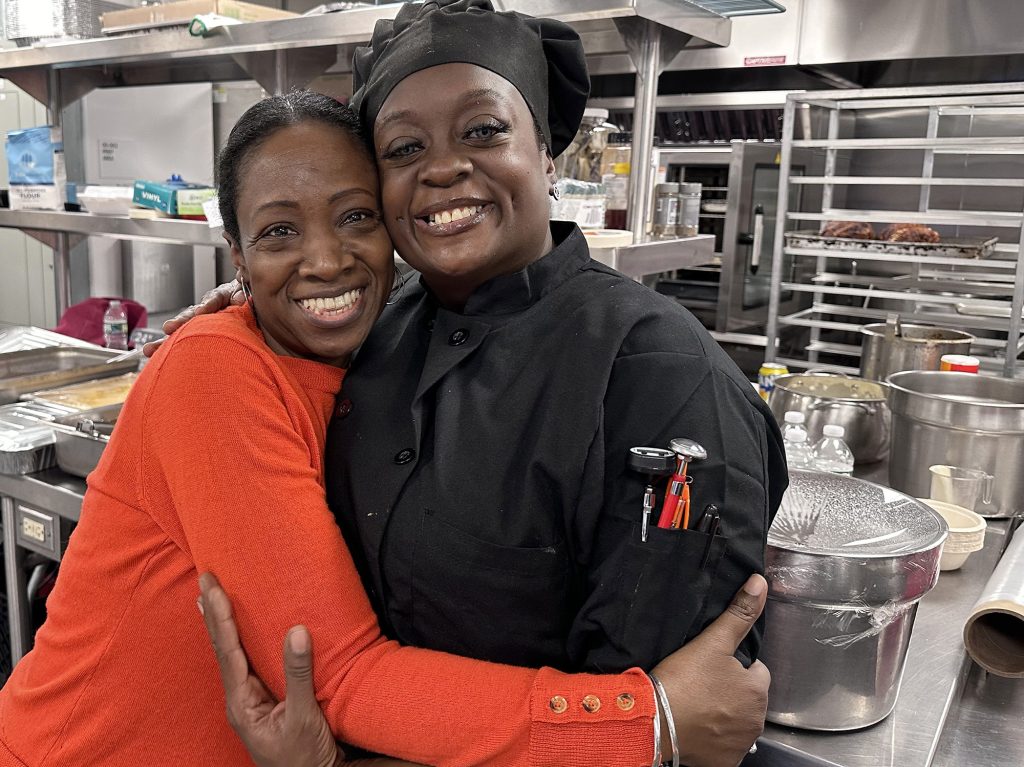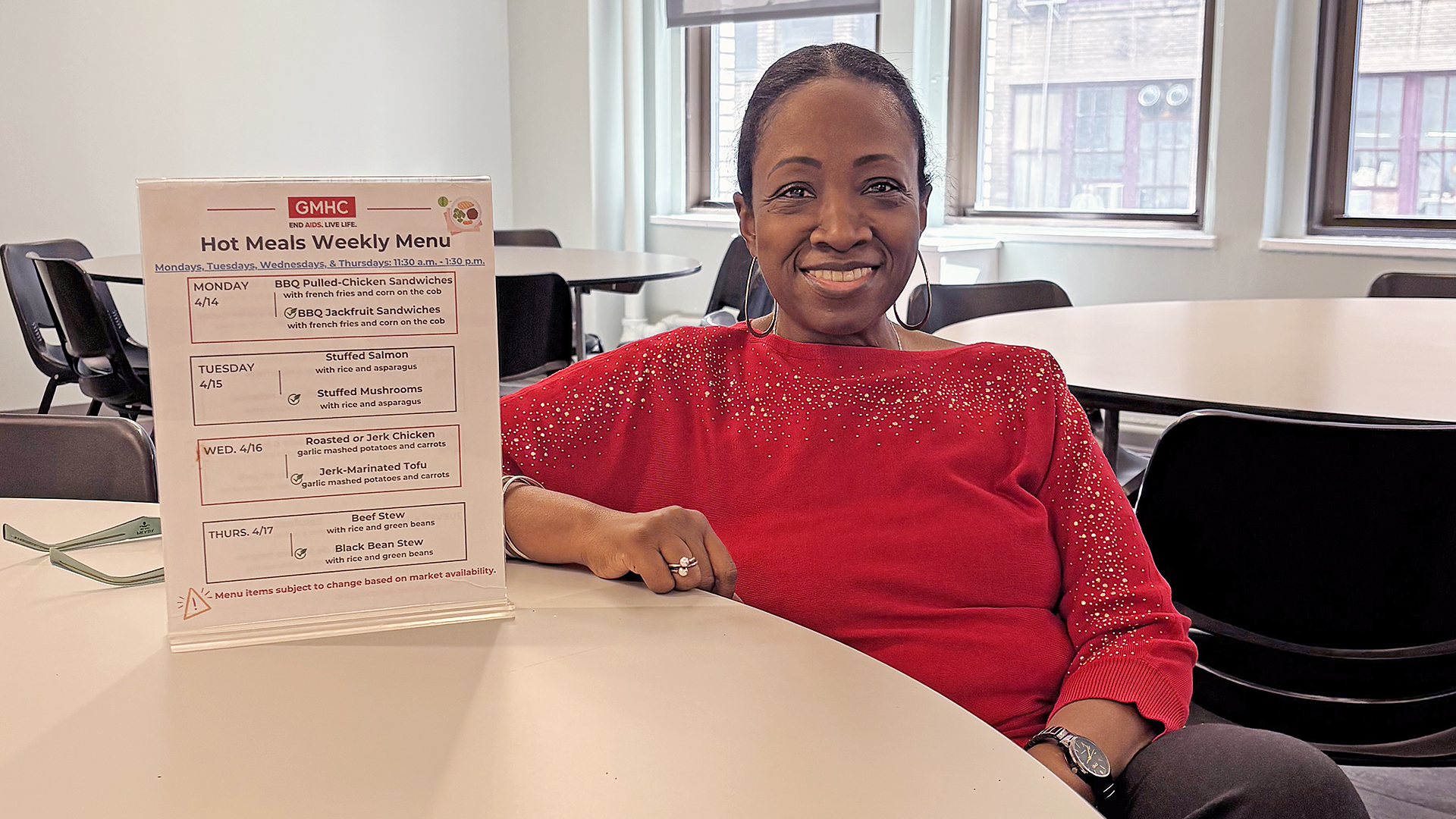These are stressful times for GMHC’s clients, says Donna Pine, Director of Client Wellness and Meals Services. Most are food insecure and many struggle with social isolation – concerns that are exacerbated by the current political climate.
For that reason, meals and wellness services have always been at the core of GMHC’s work for people living with HIV, Pine says, and she has been an integral part of them, as she marks her 25th year with GMHC. “I’ve made my career here, because I believe everybody should be treated like a human being, no matter their walk of life,” she says.
For many food-insecure clients, a nutritious, well-prepared lunch in the agency’s welcoming dining room may be the only hot meal they eat. “For 85-90% of our clients, this is the basic food they get for the day,” Pine says. Along with food, clients living with HIV also need nurture as social beings as a foundation for taking care of their health, she adds.
The dining room provides a safe, caring space where people can catch up with each other over a convivial meal and socialize with Meals Program volunteers and staff. That is especially important right now, Pine says. During lunch service, clients have shared their worries with her, such as ICE picking people up off the street. “Some of our undocumented clients stayed home out of fear — and so they went hungry,” she says. They have started returning, she adds. “But the concern is there.”
“Clients also worry if we’re ok, because of all the funding cuts in the news,” she says. “That is one reason I love working here. They’re going through it, and they are asking about the well-being of our staff and volunteers.”
All GMHC clients receive lunch at no charge. “We encourage them to come by,” Pine said. “It’s not just about the food. It’s the camaraderie – and it is where clients can learn about other programs and services.” That could be health-care navigation, housing, support, and empowerment groups – or the wellness program’s weekly meditation and Reiki classes, conveniently scheduled around lunch.
The wellness classes have just returned after a COVID-19 hiatus to protect immunocompromised clients and staff. After the COVID-19 shutdowns, GMHC resumed lunch service in the dining room, first two days per week, and then three, using a caterer for cost-effectiveness. Last fall, the agency was able to restore funding for an in-house kitchen staff, allowing it to expand lunch service to Mondays through Thursdays.
Client turnout has jumped to 150 per lunch – up from about 100 for the catered meals – since Chef Tiffany William started cooking with Sous Chef Lakia Pugh and Kitchen Assistant Zeferino Aguilar. Meals Program Administrator Nicholas Byrne rounds out Pine’s team.
“Clients love the food,” Pine says, particularly the braised turkey wings, chicken curry, and fish. “Fish never used to be popular, and now when it’s on the menu, there is a line out the door.”

A Mother’s Inspiration
For Pine’s exceptional service to people living with HIV and AIDS, the New York State Department of Health Commissioner recognized her in December with its Leanna Thornton Memorial Award on World Aids Day. “I accepted the award on behalf of my mom. I could see the pride in her face,” Pine says.
“My mother was my biggest inspiration to work with people living with HIV and AIDS,” she explains. With the onset of the AIDS epidemic in the early 1980s, Veronica Pine, a nurse, began caring for people dying of AIDS-related complications at Jacobi Hospital in the Bronx.
“I was a kid at the time, and I would ask her about her day. She would say it was rough, then sit me down and say she’d had to call a family and tell them their person had passed away,” Pine recalls. “But sometimes the family didn’t want to hear about the person. And sometimes she would sit by herself in a room with someone dying and comfort them.”
At the time, hospitals isolated AIDS patients and staff donned hazmat suits to enter their rooms. “My mother wanted to get away from that stigmatizing and comfort people. She and a few other nurses would go into their rooms, talk with them, and give them their meals,” Pine says. “‘These are human beings. We should treat them as such,’ she would say. I agree.”
Pine first heard about GMHC in high school from an AIDS Walk New York TV commercial, prompting her to participate in the Walk with a friend. She returned to the agency in college as a volunteer, serving clients meals in the dining room. “Some of the clients I’ve known from that time until now,” she says.
Needing an internship for her Lehman College degree in recreational therapy (with a nutrition minor), Pine again chose GMHC. This time she was placed in the Life Steps Program, a precursor to today’s Mental Health and Substance Use Program. “I didn’t want to leave when my internship ended,” she said.
At the time, the Wellness Program included a theater desk, which distributed donated Broadway tickets to clients. Its chief, Jeff Ridler, asked Pine to join GMHC full time. “That was on a Friday. I quit my job right then and there, and came in on Monday,” she says. “I’ve worked for the Meals and Wellness Programs ever since.”
Stay in the Know
Sign up to receive our monthly newsletter, updates about events, and other helpful information.

